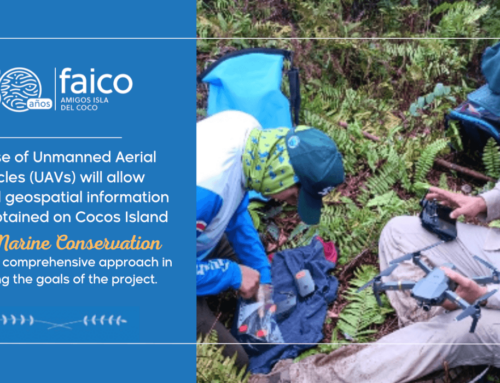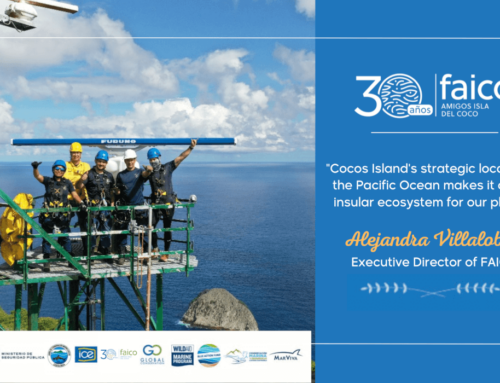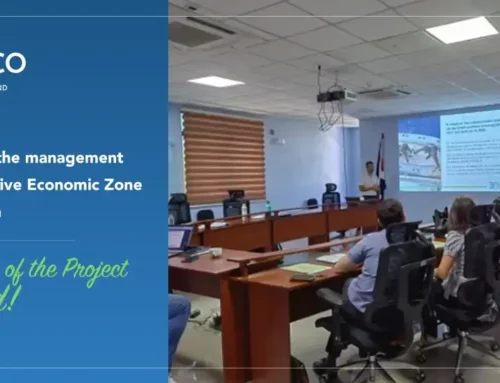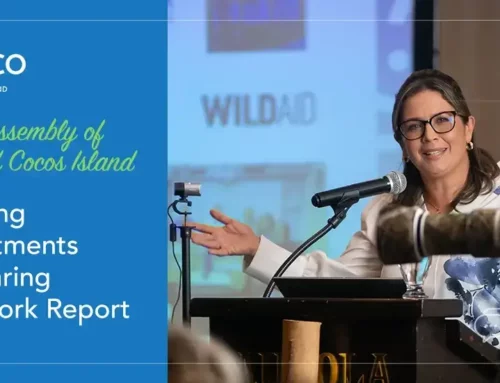- Between the Cocos Island National Park and the Bicentennial Seamounts
Marine Management Area, an area of 161,129 km 2 would be covered. - The process started in 2017, with the support of FAICO.
San Jose, December 17, 2021. Today, Costa Rica turns its eyes to the sea and takes a huge step to protecting the oceans. The signing of the decree to expand the marine protected areas of the Cocos Marine Conservation Area (ACMC) pays
back the country’s historical debt, which before today conserved less than 3% of its
jurisdictional waters.
Cocos Island and the adjacent ecosystems are a natural laboratory for the planet and an essential habitat for global marine life. For FAICO, Friends of Cocos Island Foundation, today is a day of celebration, since the conservation of 30% of the marine territory at the national level is consolidated. This milestone recognizes the importance of Cocos Island and its seamounts, as key ecosystems for the biodiversity of the Eastern Tropical Pacific.

The signature of the decree “Creation, expansion, and change of management category of the Protected Wild Areas of the Cocos Marine Conservation Area” ratifies our country as a leader in environmental issues. With the signature of President Carlos Alvarado Quesada, the Cocos Island National Park will grow from 2,034 km 2 to 54,844 km 2 , that is, 26 times bigger; while the Bicentennial Seamounts Marine Management Area will grow from 9,640 km 2 to 106,285 km 2, making it 11 times bigger.
As Alejandra Villalobos, Executive Director of FAICO, said: “we are proud to be part of this great achievement, our work and support consolidate our 28-year history and commitment to the future. These actions promote the conservation and sustainable use of one of the richest marine areas in the Eastern Tropical Pacific; thus, reaffirming the importance of marine protected areas as a tool that allows for integral conservation of ecosystems, biodiversity, and the ecosystem services they provide us. Furthermore, these positive actions promote the resilience of our oceans to pressures such as global warming and ocean acidification.”
For the Director of the ACMC, Gina Cuza, “Life is born in the sea, that is why the decision we make today to conserve our ocean is a historical milestone, not only for Costa Rica, but also at a regional and global level, since countries are connected through the sea. With this milestone comes great hope for mankind, but also great responsibility and commitment to implement continuous and forceful actions for protection, management, and sustainable use. All these actions have a high cost, and therefore, we need to be more united than ever to achieve the
success of a task that begins today.”
To achieve the expansion, several stages were developed since 2017, such as the formation of a work team under the leadership of the ACMC and SINAC, the preparation of technical studies, and the development of a consultation process with different stakeholders. After the signing of the decree, FAICO will continue to focus on supporting and strengthening the tasks of the authorities in the preparation of general management plans and their respective specific plans.
For this process, FAICO had the support of various national and international organizations, with which it will continue to work to ensure the effective implementation of these marine protected areas. However, this task will only be achieved thanks to the enormous commitment of ACMC officials, especially its park rangers. Likewise, FAICO recognizes the valuable support of the people who with their signature joined the campaign “Un mundo azul por proteger” (“A blue world to protect”).
“Costa Rica’s bold action is a model for the planet as nations work together to safeguard biodiversity and meet the global goal to protect 30 percent of the planet’s surface by 2030,” said Molly McUsic, President of the Wyss Foundation .
“By protecting one of the most biologically important ocean areas on Earth, Costa Rica is delivering on its promise to connect the dots with its neighbors in Panama, Colombia, and Ecuador, permanently protecting this ecologically and economically significant marine corridor that supports robust marine biodiversity and thriving human communities.”
With the signing of this decree, Costa Rica will achieve the conservation of a representative part of the Cocos Volcanic Mountain Range and its seamounts, essential habitats for endemic species, in danger of extinction, vulnerable, and/or of high commercial value. It will also help promote the mobility, connectivity, and migration of species of the Marine Corridor of the Eastern Tropical Pacific.



















